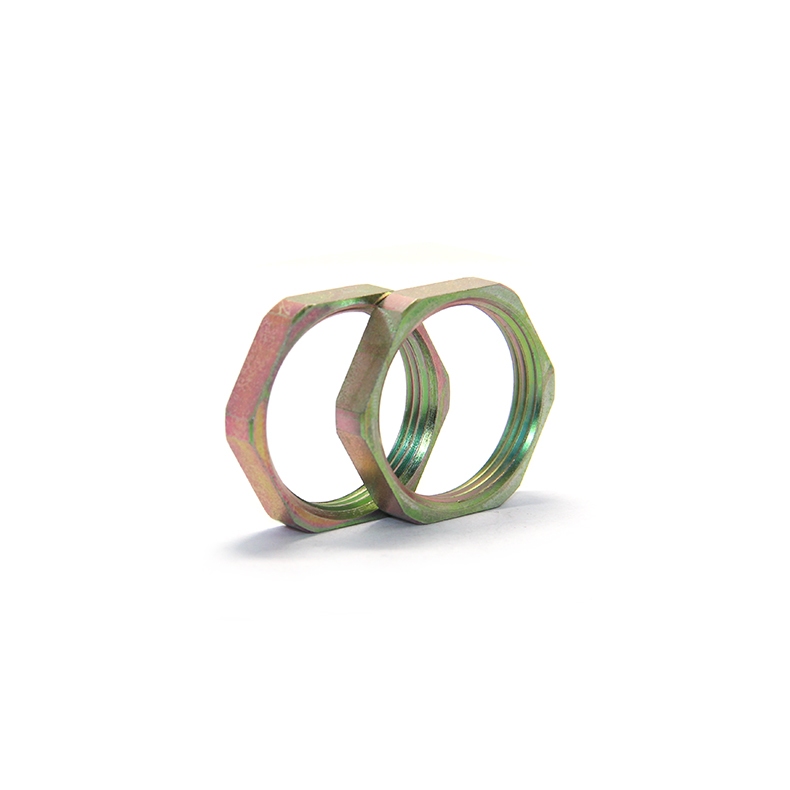
Hex Thin Nuts, also known as thin hex nuts, hex jam nuts, or low-profile hex nuts, are precision fastening components designed for applications where space is limited or where a secondary locking nut is required.
Manufactured with advanced CNC Machining, forging, and cold heading processes, our metal hex thin nuts provide excellent strength, precision threading, and reliable performance under high-stress conditions.
As a custom hex thin nut manufacturer in China, we supply carbon steel, stainless steel, and aluminum hex thin nuts that meet international standards such as ISO, DIN, and ANSI. OEM and ODM services are available to support customized dimensions, Materials, and finishes.

Compact & Lightweight Design: The thin hex nut offers a low-profile structure ideal for confined spaces.
High Precision Threads: CNC-machined threads ensure tight tolerance and smooth assembly.
Anti-Loosening Performance: Commonly used as a hex jam nut to lock another nut in position.
Multi-Material Options: Available in carbon steel, stainless steel, and aluminum for varied industrial needs.
Customizable Dimensions: Fully custom hex thin nuts available based on drawings or samples.
Corrosion & Wear Resistance: Enhanced by nickel plating, zinc coating, anodizing, or passivation.
OEM Production: We are a high precision CNC hex thin nut factory offering small-batch and bulk production.
Our hex thin nuts are produced using advanced automated systems to ensure consistent quality and precision.
Material Preparation – Selection of high-grade raw metal (carbon steel, stainless steel, or aluminum).
Cold / Hot Forging – Initial nut shape formation for maximum density and strength.
CNC Machining & Thread Cutting – Achieving tight dimensional tolerance and clean threading.
Deburring & Polishing – Removal of sharp edges and surface refinement.
Heat Treatment (Optional) – Improved hardness and fatigue resistance.
Surface Finishing – Anti-corrosion coatings such as zinc plating, anodizing, or black oxide.
Inspection & Testing – 100% dimensional and visual inspection before packaging.
We offer multiple materials to meet diverse performance requirements:
Carbon Steel: High strength and cost-effective; suitable for mechanical assemblies.
Stainless Steel (A2 / A4): Excellent corrosion resistance; ideal for marine and outdoor environments.
Aluminum: Lightweight and rust-resistant, used in aerospace and Automotive applications.
Alloy Steel: Superior hardness and tensile strength for high-load conditions.
To enhance durability and visual appeal, our hex thin nuts can undergo various surface finishes:
Zinc Plating (Silver / Yellow)
Nickel Plating
Chrome Plating
Anodizing (for Aluminum)
Black Oxide
Passivation
Polishing
Our production strictly adheres to ISO 9001:2015 quality standards.
Thread Tolerance: Up to ±0.01 mm
Surface Roughness: Ra 0.8 µm or better
Inspection Equipment: CMM, hardness tester, torque tester, optical comparator
Testing Process: 100% dimensional inspection and mechanical strength verification
Hex thin nuts are widely used in industries that require secure fastening within tight assembly spaces:
Automotive components and engines
Industrial machinery and equipment
Aerospace and aviation structures
Electronics and precision devices
Construction and marine hardware
Renewable energy systems (solar, wind)
Q1: What’s the difference between a hex thin nut and a standard hex nut?
A1: A hex thin nut (also known as a jam nut) is thinner and often used as a lock nut paired with a standard nut to prevent loosening.
Q2: Can you manufacture custom sizes or special threads?
A2: Yes, as a custom hex thin nut manufacturer, we can produce metric and inch threads, non-standard dimensions, and unique designs.
Q3: What’s your typical lead time?
A3: Generally 10–20 working days depending on quantity and complexity.
Q4: Do you offer surface treatment in-house?
A4: Yes, we provide zinc, nickel, chrome plating, and anodizing treatments to match specific application needs.
Q5: Can I order samples before mass production?
A5: Absolutely. Sample orders are accepted for quality verification before bulk manufacturing.